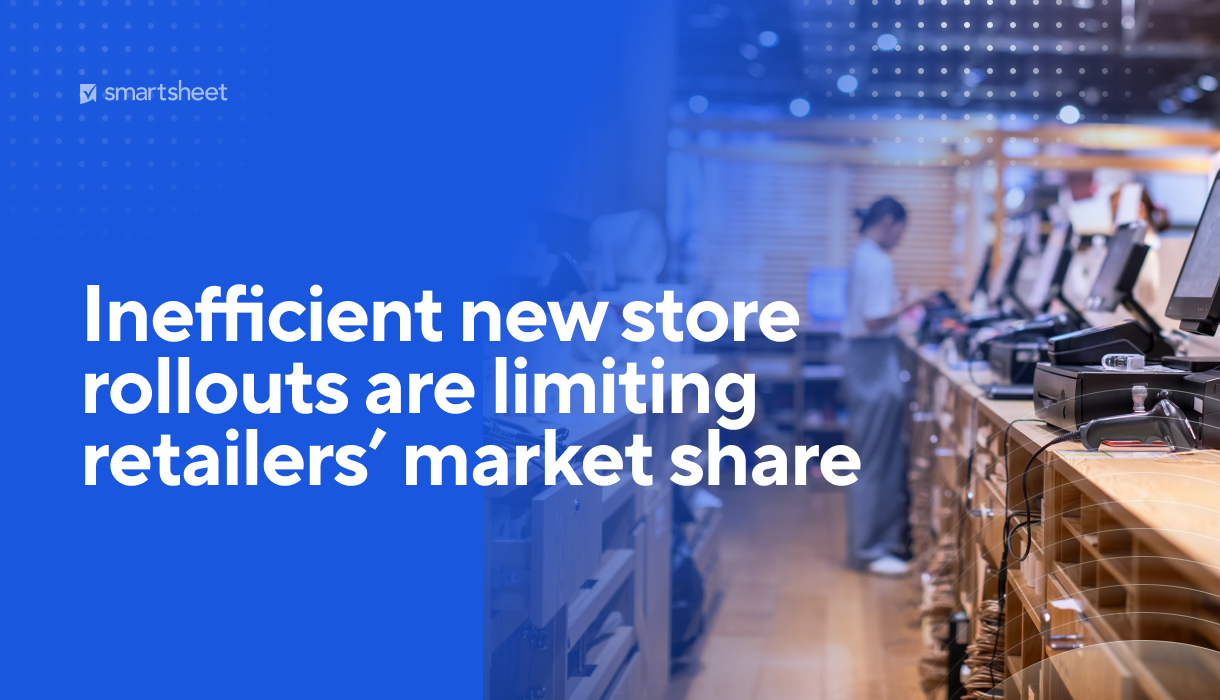Article
Inefficient new store rollouts are limiting retailers’ market share
October 4, 2024

For large retailers with a portfolio of brands and chain of stores, a key top-down goal is often expanding the number, and impact, of stores. That means your company’s growth aspirations can be thwarted by slow or slapdash fit-outs and refurbishments.
After all, investing in your store network is a major capital expense. If new stores cost more than anticipated and don’t boost sales as projected, profit margins shrink. Yet many retailers struggle with fragmented visibility of their real estate footprint and the progress and costs of fit-out projects company-wide.
Learn more about why inefficient store rollouts are no longer feasible and how you can overcome this challenge.
Expansion across multiple locations is challenging
Retailers don’t invest in physical shopfronts without confidence in market demand, and their ability to capture it. But Australia is a big country with a dispersed population and complex supply chains.
Growth driven by store expansion depends heavily on the effective planning and execution of new stores at scale. Developing or remodelling stores to meet tight deadlines — while delivering exciting formats that augment the digital capabilities and campaigns designed to attract customers — isn’t easy. It can also be hard to know how to weigh up expansion tactics with decisions about when to close or relocate underperforming stores.
The main challenges facing retailers include:
- Rising construction and labour costs: Inflation and limited supply has significantly raised the costs of building materials, and continued skilled trade shortages have exacerbated rising labour costs. Contractors are also increasing their margins. Securing capex for store development needs to be tempered by better cost controls, such as being able to easily replicate formatting projects and smarter resource allocation and hiring.
- Inefficient project processes reduce ROI: Returns can be further undermined by poor coordination at the ground level. Store launch dates are fixed, so costs tend to blow out if there are problems that delay any stage of work — as managers are forced to increase headcount or pay overtime. Avoiding lost productivity requires crystal clear clarity on processes, tasks, timelines, budgets and risks relevant to each store formatting project.
- Haphazard portfolio-wide planning and reporting: Nationwide visibility and consistency across your expansion efforts is critical for: site selection; portfolio diversification; balancing new rollouts with acquisitions; and effectively applying differentiated experiences. Sustainability improvements that customers are demanding are also harder to implement or measure without centralised oversight.
An evolving retail landscape and consumers impacted by cost-of-living pressures gives retailers a lot to think about. Well-managed store openings and refurbishments play an important role in helping large chains improve their ‘big picture’ impact, such as being able to:
- Offer personalised and unique experiences in the face of commoditization and price sensitivity.
- Out-compete disruptors like lower-cost operators, niche retailers and e-commerce stores.
- Adapt to omni-channel buying preferences, such as online purchases completed in-store.
- Apply sustainable sourcing that demonstrates strong ESG credentials that buyers notice.
Project oversight brings new locations online sooner
Because project delivery underpins sustainable growth in retail, the tools you use to manage projects are critical. You can improve your ability to compete for market share with comprehensive project management tools in place that give you:
- A clear view of where and how your footprint should grow; and
- The ability to cost-effectively accelerate timelines to launch.
Portfolio-level clarity — made possible with project tools that combine data from multiple projects for review via real-time dashboards — ensures your store opening strategy is data-led. For instance, site selection without cannibalising nearby stores is easier when you can monitor and analyse all the projects you have underway. Project tools that help you standardise roll outs nationally also make expansion efforts replicable (read: cheaper without a loss of quality).
At the nitty-gritty level, where workers are on-site designing, building and finishing shop fronts for a superior shopping experience, better project management can routinely trim days and weeks off your timelines. The right project tools help you determine the most qualified, available team members and assign tasks for the optimal workload balance.
Improved productivity increases operating margins. The risk of cost overruns is slashed, deadlines are comfortably met, and your employees and contractors can bring new levels of finesse to their work — and happily move onto the next project sooner.
Meet your market with better project management
New stores need to augment your broader position and brand, and delight customers in surrounding communities — so that each new link in the chain becomes a thriving business in its own right. Project tools that enable efficient builds as well as company-wide visibility help you plan and deliver the formats that work best to lift your market share.
Smartsheet’s enterprise-grade project management platform is the ideal solution for achieving both. Here are just three of Smartsheet’s comprehensive list of features that will help you open more successful stores across the country:
- Automated project creation based on customisable templates, assets and predefined workflows that provide the perfect mix of speed and control to guide high-standard work.
- Accurate portfolio-level reporting that effortlessly rolls up from individual store formatting projects to inform high-level property strategies and cost reduction initiatives.
- Resource management capabilities for improved team and workload allocation and insights needed to forecast hiring needs so you can refine your high performance workforce.
If you’re ready to capture and capitalise on customer demand with more efficient store openings, contact the Smartsheet team today.